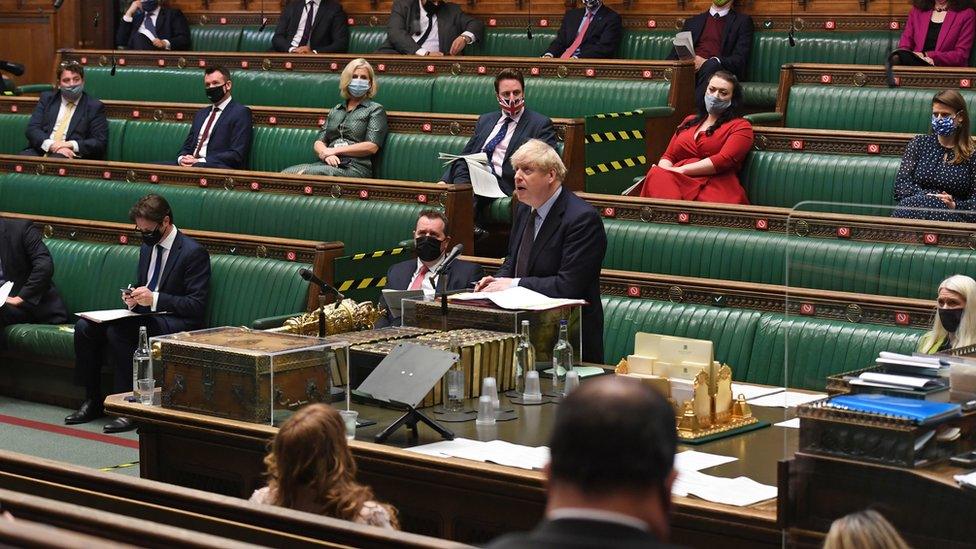Numbers look tricky for government in aid vote
- Published

When is a majority not really a majority?
If you followed the repeated strains and stresses of Theresa May's government here, you'll remember the perpetual agony of a government that just couldn't count on winning votes.
Downing Street's stability was built on sand.
After the chaos of Boris Johnson's first few months in charge, his mega majority should now, theoretically, mean Number 10 is largely protected from the prospect of defeat.
The prime minister can't be sure of that today, and there's a long list of reasons why the normal parliamentary arithmetic could favour his critics when it comes to a potential vote on foreign aid tonight.
It is not certain that the Speaker of the Commons Sir Lindsay Hoyle will allow a vote to go ahead, but if he does, the numbers look very tricky for the government.
First, plenty of backbenchers, and also privately some in the government, think that cutting aid right now is simply the wrong thing to do as a matter of principle.
Sacred documents
Next, the commitment to stick with spending 0.7% of GDP was in the Tory manifesto, and MPs don't like having to explain why promises have been broken.
Manifestos are not exactly the politically sacred documents of years gone by, but they retain some of their special status.
Thirdly, the cast list of those arguing to keep the commitment is full of well known Conservatives, including former prime ministers and cabinet ministers, who know how to get headlines, and how to organise.
In addition, they have been planning and trying to build support quietly for months, since the cut was first announced.
There are dozens of former ministers on the backbenches, who may not agree on everything but can agree on this, and are not exactly Mr Johnson's biggest fans.
Lastly, the timing of this vote is awkward indeed. Mr Johnson is about to play host to the leaders of the free world at the G7.
It is his first big public entrée into the highest levels of diplomacy as prime minister, and he will be hopeful of grinding out agreements on concerted action on Covid vaccines, recovery from the pandemic, and plans to tackle climate change.
Does starting that week being beaten by his own backbenchers for reneging on a promise to the world's poorest sound tempting?
The government always knew it would face resistance when it introduced the change.
There are strong arguments that money has to be saved at home, and the cut is intended as being temporary too.
Ministers point to the UK's still generous record of giving. And many MPs believe that the change is popular.
But passing the test of public opinion is not the same as passing the test of Parliament.
At this stage, soundings from Downing Street suggest that the issue will go to a vote, if the Speaker chooses it.
And there will be meetings today between government and backbenchers who are tempted to vote against Number 10.
Vigorous arm-twisting could lead some of the malcontents to change their mind. And, as ever, it is one thing for an MP to be tempted to vote against the government; it is quite another to go through with it.
But there's a reason why ministers didn't want to give Parliament a say on the aid cut to start with.
It's the same reason that's led the PM to budge rather than lose in the past, and the same reason that suggests that a compromise of some kind by the end of the day wouldn't be that much of a surprise - even governments with the notional insurance policy of a thumping majority don't like holding votes they can't be sure to win.
And if the Speaker does not let the vote go ahead today, it is likely this is a battle delayed for another day.
Correction 10th February 2022: This article has been amended to remove a word considered offensive to Welsh people.
